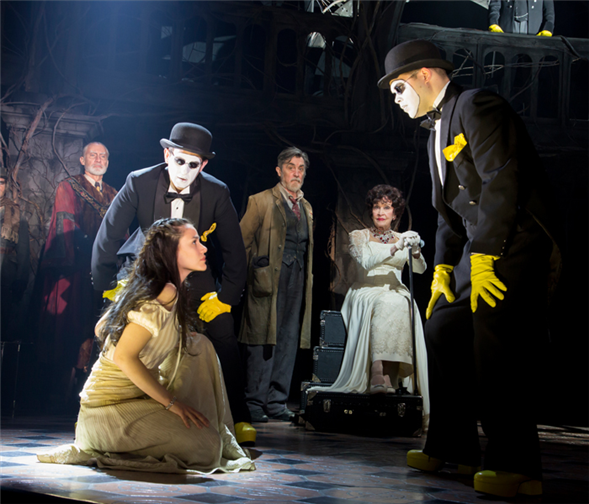Behind the most unusual characters in Broadway's The Visit
---
Welcome to Building Character, our ongoing look at performers and how they create their roles
"As an audience member, even before you hear that we're eunuchs, you can say, 'Okay, these people are not normal.'"
That's how Matthew Deming describes his entrance in
The Visit, the viciously beautiful Kander and Ebb musical that's currently making its Broadway debut at the Lyceum.
And he's right: When Deming and his fellow eunuch, played by Chris Newcomer, slide onto the stage, they seem like creatures from another world. In matching black suits and bowler hats, they move in perfect unison, as though they're listening to the same commands. And while most of the other characters are draped in grays and browns, they sport dazzling yellow gloves and platform shoes.
Then there's the makeup. Both men's faces – including their lips -- are painted white. Their eyes -- which are often hidden behind tiny, dark glasses -- are ringed in heavy black. This could almost make them seem like avant garde clowns, except they never smile. Instead, they often stand expressionless, like ghostly sentinels waiting to drag someone to hell.
Which is essentially what they do. Based on the 1956 play by Friedrich Dürenmatt.
The Visit charts the terrible revenge that Claire Zachanassian (Chita Rivera) exacts upon her hometown. Decades ago, her neighbors cast her out for having loose morals, and while she was in exile, she became the richest woman in the world. Meanwhile, the townspeople collapsed into ruin, and now she has returned with a proposal: She will give everyone a fortune if they execute Anton Schell (Roger Rees), the man who ruined her reputation.
In other words, Claire uses her money, power, and bloodlust to warp the morality of the world. Her eunuchs – whom she ordered to be mutilated because of their role in her shame – are a constant reminder of her dreadful intentions.
Their strangeness also reminds us that everything on stage has been twisted. In a place like this, there's really no doubt that the town will accept Claire's terms, even if they give lip service to taking the high road.
{Image1}
Newcomer enjoys how his character affects our understanding of the show. "We're in a funeral procession that starts from the very beginning, and it slowly creeps right to the end," he says, noting that he and Deming (as well as Tom Nelis, who plays Claire's butler) literally move at a different pace than the other characters. "I think having that slow, unstopping motion going along with all the frenzy is a comment to say, 'This is coming. This death is happening.' It's interesting to have that going on unceasingly in the background."
But how do actors perform such symbolically potent roles? Deming and Newcomer can't exactly develop realistic psychological motivations, but they can't just pose and gesture either.
The answer lies between those two extremes. During one song, for instance, we flash back to the moment the eunuchs betrayed Claire on Anton's behalf. For those few minutes, Deming and Newcomer come horribly alive, making grotesque expressions and tearing around the stage. "I treat those moments as real," says Newcomer. "We're in the audience's face and the townspeople's faces, and it's really strong."
On the other hand, the eunuchs are frequently still, watching what's unfolding around them. During those stretches, it's actually better for them to "become part of the tone poem that's going on," as Newcomer says.
In fact, director John Doyle – who also helmed
The Visit when it played last year at Williamstown Theatre Festival – prefers for his cast to do as little as possible when they're not driving a scene. "I can't tell you how many times he's edited people's acting choices to make them simpler or simply non-existent," says Deming, who was not only in the Williamstown version of the show, but also in a 2008 production at Virginia's Signature Theatre. (The Signature run also starred Rivera, but it was not directed by Doyle.)
"In rehearsal people would have these little bits," Deming continues, "and John was like, 'I see why you're doing this, but it's catching my eye, and right now we're listening to Chita's speech.' In a way, he gave us permission to just own that stillness throughout the entire production."
Meanwhile, Deming and Newcomer's singing provides another vital piece of their performances. Both men are classically trained countertenors, and the eunuchs only sing in that high, falsetto style. This heightens their oddity, and it demands a unique set of skills.
Deming credits Doyle for helping him navigate his desire to sing well and his need to communicate. "As a classical singer, you're always hovering over yourself thinking, 'Am I doing this correctly? Am I producing a beautiful sound?'" he explains. "John really gave us permission to let that go a little bit. I don't ever feel like my goal is to sound like crap as a eunuch, but it's great when the director says, 'We know you sound good, but make sure you're still embodying this character.'"
---
Mark Blankenship is the editor-in-chief of TDF Stages
Top photo: Deming (left) and Newcomer confront a co-star. Photo by Thom Kaine.
